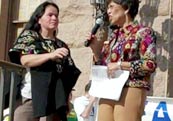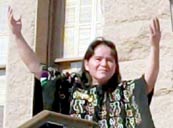Please read the short essay, or just click the answers to these simple questions. You may need to *enable popups.
1. If you were an editor, which of these lead paragraphs would you probably prefer?
a. Immigrants rights leader Margarita Alvarez astonished over 1,000 participants in a health care reform rally in Austin. Her speech featuring her deep commitment to the cause and her amazing oratorical ability was the high point on a program that included the top leaders in the reform movement.
b. Immigrants rights leader Margarita Alvarez astonished over 1,000 participants in a rally on November 14. Her speech, featuring her deep commitment to the cause and her amazing oratorical ability, was the high point on a program that included the top leaders in the reform movement. Alvarez is from Central America.
c. Immigrants rights leader Margarita Alvarez astonished over 1,000 participants in a health care reform rally in Austin on November 14. The Central American's speech was the high point on a program that included the top leaders in the reform movement.
d. Immigrants rights leader Margarita Alvarez spoke to over 1,000 participants in the health care reform rally in Austin on November 14. Her speech, featuring her deep commitment to the cause and her amazing oratorical ability, was the high point on the program
2. For a workers' publication, which line might add the most to the lead?
a. A really good time was had by all
b. Her contribution moved the reform movement forward for everyone
c. She was almost late getting there
d. People are amazed to learn that she is the mother of 8 children
3. Which photo would be best to go with this report?
.a. 
*If popups don't work when you click on the answers, you will probably get a yellow line across the top of your screen. Click on it and choose "temporarily enable popups."
 |
Become a Worker Correspondent |
"Some things must be said, and there are times when silence becomes an accomplice to injustice.” --Ayaan Hirsi Ali, legislator in Netherlands, quoted in Dallas Morning News
The Workers Movement Must Have Eyes and Ears
Worker Correspondents are the eyes and ears of the progressive movement. Almost everyone learns things that are needed for the great information base that guides our strategies and tactics. Almost everyone can contribute to publications.
What's News?
Everything that informs or helps organize the working class and our allies is news. When we succeed or fail, it's news that can be of value to others. When important questions are poised before us, it's news. Every battle in the struggle for democracy, large and small, is news. If it interests you, it probably interests us, because we're like you.
Maybe you've seen a movie, listened to a CD, or read a book that you want to say something about. Fine. We want to hear about it. If a play, a recording, or a movie seems important, write a review. Comments on other articles in the form of letters to editors are valuable.
How to write - a few tips
Take good notes if you can. interview people and get direct quotes. Try to get the facts straight, even if there aren't many of them. Spell names and titles correctly. Other spelling errors or grammar mistakes can be caught and corrected, but only the original correspondent can get the names right.
Don't worry about how to tell a story. It will tell itself if you present the facts.
Standard journalism classes ask students to present as much as possible of the "W-H" facts in the first paragraph.
The "W-H" Facts
- WHO did it?
- WHAT did they do?
- WHEN did they do it?
- WHERE did they do it?
- WHY did they do it?
- HOW did they do it?
For worker correspondents, we may want to add, "Here's why it matters!"
It doesn't hurt to throw in your opinion on events. If the editors don't like it, they can always take it out. It's easy to delete things.
Preparing copy
If you want, you can try your hand at writing your own brief headline. They can change it if they don't like it. If you expect credit for your work, you have to include your name. Your phone number and e-mail is a good idea, because editors might need to ask for further information. Lots of times, our stories are combined with other reports from around the country.
How Long?
If you write more than 800-900 words in a single article, you might expect the editors to try to shorten it.
When?
As soon as you can after the event happens.
Want to Add Photos?
With modern digital cameras, anybody can get worthwhile photos. Send two or three of your best along with your report if you can. Don't send a bunch. What makes a good photo? One that helps tell the story.
A problem with many otherwise good photos is that they are taken from too far back. Don't be afraid to get close to your subject. The editors like to know who took the photo, when, and where. If you want to try writing your own captions, they appreciate that, too.
Follow Up
Articles and photos bring people together. Share them with everybody interested. They will benefit from it, and you will, too. Don't be surprised if people start asking you to cover their events!
Can You Do More?
Of course you can, and you probably will, once you get started. But start with basic information reports.
Please use the form below to provide some feedback, or just send me an e-mail.



